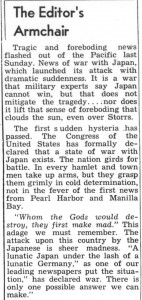December 7, 1941 was a Sunday. In Storrs, UConn students prepared for end-of-the-semester exams and the upcoming winter break. That evening, History Professor Andre Schenker traveled to Hartford with his family to see a play. At some point, an usher approached him with an urgent message. Five thousand miles to the west, at 1:18pm that afternoon (7:48am Hawaiian time), Japanese naval and air forces had attacked the United States Pacific Fleet at Pearl Harbor, inflicting heavy casualties and causing severe damage. Schenker immediately set off for radio station WTIC, where he served as a world affairs commentator. Later that night, he began his broadcast with the following words:
“It has happened. Japan has decided to commit suicide by attacking the strongest power on earth, the United States…As you all know by now, this morning in the Far East, which means this afternoon our time, a Japanese force suddenly attacked Manila, in the Philippines, and another force attacked the Gibraltar of the Pacific, our base at Pearl Harbor in the Hawaiian Islands.”
(You can hear Professor Schenker’s full commentary on the attack here)
The next day, President Franklin Roosevelt called for a declaration of war against Japan, which led to Germany and Italy issuing similar declarations against the U.S. on December 11th. America had officially entered the Second World War.
Even as the students and faculty at Storrs processed the news, Connecticut alumni halfway around the world already found themselves in harm’s way. Major Maurice F. “Moe” Daly, a popular football player from the Class of 1923, was stationed at Clark Air Base in the Philippines during the Japanese attack there on December 8th. After participating in its heroic defense, he would eventually be taken prisoner when Bataan fell the following April, and died in captivity.
The attack on Pearl Harbor signaled a major transformation in campus life at Storrs. Blackouts were put into effect, ROTC training was ramped up, and the pages of the student newspaper were increasingly filled with war-related news. Soon, male students and faculty members alike left the campus in droves to join the armed forces. At least 114 of them would not return after the war’s end in 1945.


